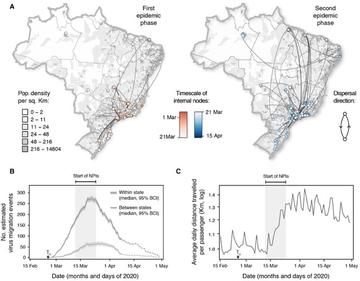New study in Science on the SARS-CoV-2 pandemic in Brazil

Brazil currently has one of the fastest growing coronavirus epidemics in the world. As of 22 July 2020, Brazil had reported more than 2,118,000 cases, the second largest number in the world, and more than 80,000 deaths. Writing in the journal Science, researchers from the UK (University of Oxford and Imperial College) and 15 Universities in Brazil generated a representative dataset of 427 new genomes sampled across Brazil. This is the largest genomic dataset from Latin America and one of the largest in the world. They combined genomic, mobility and epidemiological data to better understand SARS-CoV-2 transmission at different scales and to investigate the impact of non-pharmaceutical interventions (NPIs) in virus transmission and spread in the country.
In a nutshell, the findings are:
- Multinational project sets up task force to uncover SARS-CoV-2 diversity across Brazil
- Genetic analysis of the largest dataset from Latin America revealed >100 international virus introductions in Brazil and highlights changes in the patterns of virus spread across the country
- 76% of the Brazilian virus strains belong to three clades introduced from Europe between 28 February – 11 March 2020
- Interventions reduced the R number from >3 to 1–1.6 in São Paulo and Rio de Janeiro, and remain insufficient to control virus transmission
- There is an urgent need for measures such as screening, contact tracing and social distancing measures to contain virus transmission.
Part of the team of researchers, Dr Andreza Aruska de Souza Santos, a lecturer at the Latin American Centre, was in charge of looking at NPIs in Brazil, such as school closures and store closures during late March. In the article, data show that NPIs helped to reduce the reproduction rate (R) from greater than 3 in São Paulo and Rio de Janeiro, to close to 1 in both states. However, since restrictions were lifted, the R number in both states remains above 1 – meaning the epidemic is growing.

Figure 4 in the paper: Spread of SARS-CoV-2 in Brazil
Dr Andreza A de Souza Santos said: “it is important to see the role of social sciences in genomic epidemiological studies such as the one we now published. The pandemic crosses knowledge areas, as inequalities as well as decentralized policies require political knowledge on Brazil. The combination of epidemiology, genomic, mobility, and political analysis, as well as collaborations across various universities in the UK and Brazil, make this a very special and robust study.”
Prof. Nuno Faria, UK principal investigator of the CADDE Project, Reader at Imperial College and University of Oxford, and co-corresponding author of the study, said “Genome sequencing is increasingly becoming part of the toolkit for the response to infectious epidemics and can have a direct impact on public health. We generated 427 new SARS-CoV-2 genomes from across Brazil and we analyse these together with mobility and epidemiological data to investigate how SARS-CoV-2 spread and transmission changed in response to control measures implemented in the country.”
At the Latin American Centre, Andreza currently directs the Brazilian Studies Programme, a hub for research, seminars and interviews on Brazil at Oxford. She teaches the courses Cities and Citizenship in Latin America and Politics in Brazil.
Read the full paper: Evolution and epidemic spread of SARS-CoV-2 in Brazil
https://science.sciencemag.org/content/early/2020/07/22/science.abd2161
Brazil media coverage for Portuguese Speakers:
BBC News Brasil: https://www.bbc.com/portuguese/brasil-53500667
Revista Veja: https://veja.abril.com.br/saude/estudo-inedito-mostra-a-trajetoria-do-virus-no-brasil/
Jornal Nacional: https://g1.globo.com/jornal-nacional/noticia/2020/07/23/acoes-para-conter-a-pandemia-no-brasil-mesmo-com-percalcos-ajudaram-a-reduzir-transmissao.ghtml



